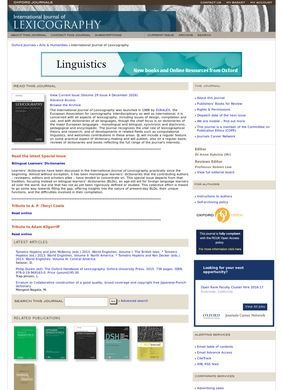The International Journal of Lexicography is an Oxford Academic-published journal that offers scholarly, specialized content in the field of lexicography. The publication is committed to exploring various aspects of lexicography, a discipline that is interested in the design, compilation, and use of dictionaries.
The resource predominantly focuses on the dictionaries of major European languages, though dictionaries of all languages are covered to some extent. Each issue of the journal contains ample content to meet the needs of both academics and professional lexicographers. It usually features advanced articles, editor's choices, and special issues submitted by proficient authors in the field.
Accessible through Oxford Academic, the journal has a range of navigation options, including the ability to search specific terms or keywords, allowing subscribers to easily locate desired content or explore topics within the field. Besides, the resource maintains a mobile version, ensuring convenience for users who prefer accessing it on their handheld devices.
The International Journal of Lexicography comes with an Open Access feature, granting wide access to its rich content and encouraging inclusive scholarly participation in lexicography. The publication also offers purchase alerts, enabling subscribers to keep abreast of the latest additions to their areas of interest.
This journal is enriched by a competent editorial board that oversees its publication ensuring content accuracy and pertinence. The current chief editor, Robert Lew, together with reviews editor, Geraint Rees, maintain a strong academic tone perpetuating the journal's reputation in the scholarly community.
As a part of the Oxford Academic network, the journal is not isolated, boasting synergies with books and other journals that make it an integrated part of an academic ecosystem. The academic quality of the publication is underlined by its impact factor, which stands at 0.5 and a five-year impact factor of 0.6; these figures reveal their influence in global academic discussions.
The Self-Archiving Policy allows authors to preserve their own work, while offering advertising and corporate services to engage industry participation. Consequently, this journal offers a robust blend of academic resources, research tools, and professional opportunities making it a comprehensive platform for academic discourse on lexicography.
In terms of improvements, the overall user experience could be enhanced with a more intuitive interface to ease navigation through the wealth of content. Also, while major European languages are a focal interest of the journal, increased coverage of dictionaries from other global languages could broaden its appeal to a more diverse international academic audience.
Verdict: the International Journal of Lexicography, located within the Oxford Academic ecosystem, is a valuable resource for those invested in lexicographical studies, offering dynamic and well-rounded content. As it continually evolves to meet the requirements of the academic community, the resource maintains the potential to further broaden its influence in the future.
